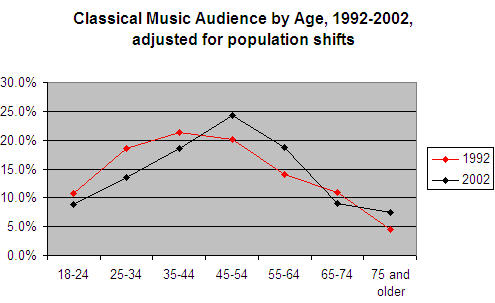Well, proof is a strong word. But I'd think that the aging of the classical music audience -- over just about a 50-year period -- is a very strong sign that our culture has shifted. And shifted away from classical music. But first a step backward. I'm writing more posts in my current series than I expected to. So to get reoriented: My main thesis is that building a new, young audience for classical music ought to be our most urgent priority. Why? Because we're losing the audience we have, and there will never be another audience -- or at least … [Read more...]
Common sense
When I asked in a post two weeks ago why we don't know precisely how orchestras (and other classical music institutions) are doing, I got some fascinating pushback. (As, of course, I've gotten before.) I'd made what I thought was the commonsense point that we do know how newspapers are doing (badly), and how the US auto industry did when it was in trouble. There was no dispute about these judgments, or about the data that supports them. So why are we in classical music so out of it? Why can't we agree on what's happening on our turf? … [Read more...]
Good news from Toronto
I talk a lot about problems with classical music, and maybe don't say enough that what I really care about is classical music's rebirth. Which -- knock on any wood-like substance available -- seems to be happening. For instance: The Toronto Symphony says it has an amazingly young audience. More than one-third of it is younger than 35! I read this some months ago in a story that appeared late in June, in the Culture Monster page on the Los Angeles Times website. And then was surprised to see that the story -- in journalist-speak -- … [Read more...]
Why don’t we know?
If you look back on my post about David Gockley and the San Francisco Opera -- quoting David's very stark words about the company's financial problems -- you'll see a lively debate in the comments, between Lisa Hirsch and myself. The debate, essentially, is about whether the San Francisco Opera really is in as much trouble as David says. And that disagreement spreads toward other institutions. When the Philadelphia Orchestra announced it would declare bankruptcy, was it really in as much trouble as it said it was? Or, maybe more pointedly, … [Read more...]
Cries of pain
"The reason I subscribed to Capital Public Radio is for classical music," says a subscriber to the public radio station in Sacramento, CA. Which, like many (most?) public radio outlets, has cut back on classical programming. And now, adding insult to injury, is moving its jazz broadcasts to a classical station it runs, displacing classical music even more. "Many classical music lovers feel they have been left in the lurch during their prime listening time at home," says the news story I linked to. "I'm feeling disenfranchised," says the … [Read more...]
Another sign of trouble — and a solution?
The David Gockley statement I blogged about was only one declaration of trouble in classical music that caught my attention recently. Another was a news story about the Colorado Symphony, an institution that feels it needs fundamental change. The emphasis is different here. David talked about the problems he faces. And the Colorado Symphony talks about solutions. But the solutions are needed, the story notes (if only in passing), because the Symphony is "cash-short" -- hurting for money. Which means it has, in essence, the same problem as … [Read more...]
More clouds gather
Here's a classical music leader pointing at dark clouds hovering over our field. I'm talking about an admission of serious trouble, in an extraordinary -- extraordinarily honest and forceful -- statement by David Gockley, General Manager of the San Francisco Opera, and (I'd think by more or less unanimous acclaim) one of the top arts managers in the US. David says that his company is in serious trouble, because of factors that affect all arts organizations like it. He wrote this in the Opera's program book, in November 2010. A friend … [Read more...]
Gathering clouds
In the past, I've started the year off here with posts called "Where we stand," in which I sum up the current state of classical music, or, maybe more accurately, consider the latest evidence that classical music -- in its mainstream form -- is declining. But right now I'm rewriting last year's version of that document, to use in my Juilliard course on the future of classical music, which starts next week. (The link takes you to last year's curriculum. I'll put the new one up when the course starts again.) So I'll hold off on the current … [Read more...]








